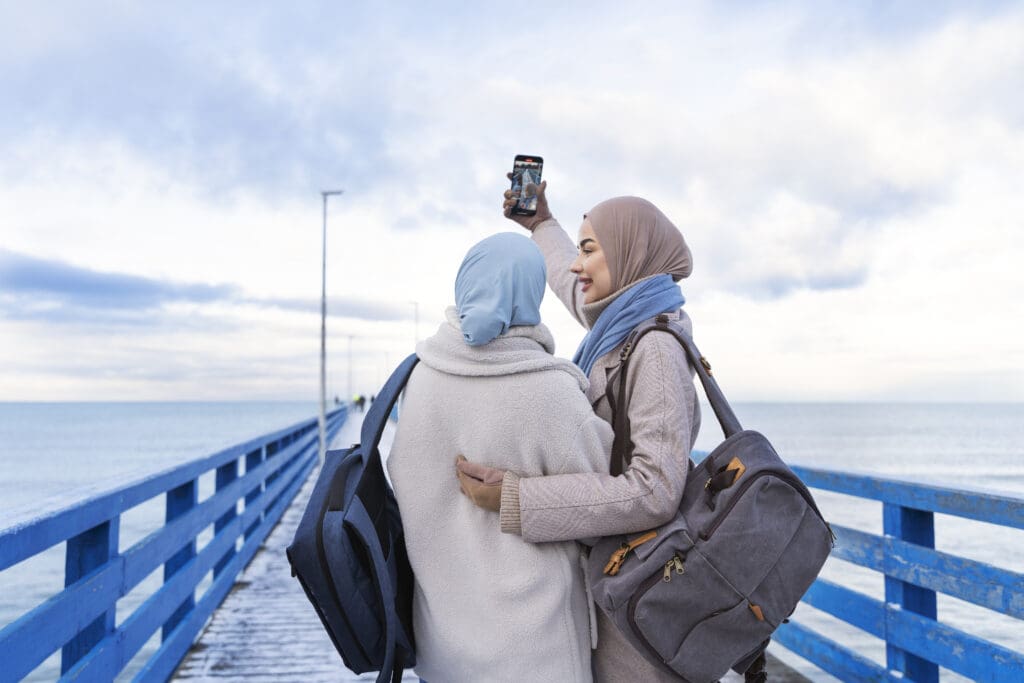
Periods in Motion: Why Travel Shifts Your Cycle and How to Care for Yourself
Travel is joyful, but it’s also a shake-up. New time zones, late nights, different food and full days. Your hormones notice, and your period might show up early, late, lighter, heavier, or skip once, while your body rebalances. But that can be okay! You’re adapting.
In this guide, we’ll take you through why travel changes your cycle, what to expect, how to prepare, and faith-friendly tips for travelling Muslimahs
.
Why travel can change your cycle
Your cycle is coordinated by the hypothalamic–pituitary–ovarian (HPO) axis (a conversation between the brain and ovaries). Travel interrupts that conversation in a few common ways:
1) Stress
Rushing, social plans, dehydration, and little sleep raise stress hormones. This can delay ovulation (leading to a late period) or suppress it for a cycle (a missed period). Once you’re back in routine, most cycles settle within one–two cycles.
2) Jet lag and your body clock
Crossing time zones confuses your circadian rhythm (light–dark timing). Because circadian signals help regulate reproductive hormones, jet lag can shift ovulation and your period date. Eastbound travel usually feels harder than westbound.
3) Sleep disruption
Short or broken sleep increases stress hormones and inflammation. That can shift timing, intensify cramps, and worsen PMS (for example: headaches, irritability, breast tenderness).
4) Food, fluids, movement
Late meals, more sugar or less fibre, and fewer routine workouts can cause bloating, constipation, and blood sugar swings — all of which can make PMS feel heavier.
5) Climate and altitude
Heat, humidity, or high altitude change hydration and blood pressure. You might feel more fatigued or headachy around your period.
What you might notice
- A later or earlier period
- A skipped period for one cycle
- Flow that is heavier or lighter, or bleeding that’s longer or shorter
- A shifted fertile window (ovulation moves)
- PMS that feels stronger
Check in: If you could be pregnant, take a test. See a clinician if bleeding is very heavy (soaking hourly, >7 days, large clots), pain is severe, or your period is absent for 3 months.
Contraception and tracking
If you use birth control, keep your routine steady. For pills, aim to take them every 24 hours; set phone alarms and adjust to local time gradually. Traditional progestin-only pills are time-sensitive (a 3-hour window for many brands, 12 hours for some desogestrel POPs — check your leaflet), so carry a small note with your “home time” and “local time” dose to avoid confusion, and use condoms if you’re late.
Combined pills tolerate small timing shifts, but follow your brand’s missed-pill guidance and use backup for seven days if advised.
Rings, patches, implants, and IUDs ignore time zones (easy win). If you rely on fertility awareness (temperature, cervical fluid), expect jet lag and poor sleep to blur your patterns; your fertile window can shift, so use backup if you’re avoiding pregnancy. Pack extra pills for delays, keep them in your hand luggage, and bring a copy/photo of your prescription.
If you might need emergency contraception, check availability at your destination and consider carrying it with you (some countries require a prescription).
Tips to lessen the load
Pack a small “period travel kit”
Here are some suggestions to consider:
- Your usual pads/tampons/period underwear (availability varies by country)
- Pain relief you can tolerate (e.g., ibuprofen/naproxen if safe for you, or paracetamol)
- Heat patches or a mini hot-water bottle
- Electrolyte sachets + refillable water bottle
- Zip bags for disposal + spare underwear
- If using a menstrual cup: a backup cup, fragrance-free wipes, hand sanitiser, and your cleaning solution
- Any regular meds (e.g., iron, thyroid)
Check in: NSAIDs aren’t suitable for everyone (e.g., certain stomach, kidney, or bleeding conditions). If unsure, ask your clinician before you travel.
Make travel easier on your cycle
- Reset with light: Seek morning daylight on arrival; dim bright screens at night.
- Protect sleep: Aim for 7–9 hours. Cool, dark room; eye mask, earplugs, white noise if needed.
- Hydrate and fuel: Drink water regularly, especially on flights/heat. Build balanced plates: protein + complex carbs + veg + healthy fats.
- Keep moving (gently): Walk after meals; do 10–20 minutes of stretching or bodyweight moves. Movement eases cramps, constipation, and jet lag.
- Go easy on caffeine: Both disturb sleep and can worsen cramps and mood swings.
- Track, but don’t panic: Log symptoms, but note that you can exclude that cycle from your app’s averages so predictions don’t skew.
Symptom soothers on the road
- Cramps: Start pain relief at the first twinge (if safe for you); add heat.
- Bloating/constipation: Hydrate; add fibre (fruit, veg, oats); gentle walks.
- Headaches: Fluids, rest your eyes; consider magnesium if appropriate.
- Mood dips: Lower-pressure days near your expected period; brief breathwork, journaling, or a check-in with someone you trust.
Scheduling tests
Some tests (e.g., Pap smear, fertility bloods, certain scans) are cycle-timed. If travel may shift your period, leave a buffer in your appointments or speak to the clinic about timing.
When to see a doctor
Most travel-related changes settle within one to two cycles once you’re sleeping, eating, and moving in a steady rhythm again. If changes persist, look a little deeper.
Signs that need a check-in with a clinician can include:
- Periods missing for ≥3 months (or ≥6 months if your cycles were irregular before).
- Cycles consistently <21 days or >35 days, or big swings month to month.
- Very heavy bleeding (soaking a pad/tampon hourly, >7 days, passing large clots), or bleeding between periods.
- Severe pain that stops you working, studying, or sleeping.
- New symptoms of thyroid issues (unexplained weight change, heat/cold intolerance, hair loss, palpitations), high prolactin (milky nipple discharge when not breastfeeding), or androgen excess/PCOS (irregular periods plus acne, facial/body hair, scalp hair thinning).
- Low energy with light-headedness—possible iron deficiency.
- A history of eating disorder, RED-S (relative energy deficiency in sport), or over-exercise with weight loss and missed periods.
- Ongoing shift work or ultra-frequent long-haul travel with chronic sleep debt.
A brief Islamic perspective
Travel is recognised in our dīn, and rukhaṣ (concessions) make it easier. Follow the school (madhhab) you trust or seek a teacher’s guidance. Below are shared concessions and a summary of differences.
- Shortening prayers (qaṣr): 4-rakʿah prayers (Ẓuhr, ʿAṣr, ʿIshāʾ) become two while travelling. Fajr and Maghrib are not shortened.
- Fasting in Ramaḍān: A traveller may postpone the fast and make it up later; if fasting is very hard, it’s better not to fast.
- Wiping over khuff (leather socks): Up to three days/nights for travelers in place of washing the feet.
- Sunnah prayers: Some confirmed sunnahs may be left while travelling; the Sunnah of Fajr is retained.
Key differences by madhhab
| Concession | Ḥanafī | Mālikī | Shāfiʿī | Ḥanbalī |
| Minimum travel distance | ~78 km | ~77 km | >80 km | 138 km (some contemporary views ~81 km or local custom) |
| Duration of stay (qaṣr allowed) | <15 days | <4 days (touring resets per city) | <4 days (arrival/departure counted separately) | ≤4 days (longer if purpose unresolved) |
| Combining prayers | Not permitted; pray each on time, shorten only | Permitted in specific difficulty; not usually with shortening | Permissible to combine Ẓuhr–ʿAṣr and Maghrib–ʿIshāʾ (early or late time) | Permissible, but better not to unless needed |
| Intention for travel | Purpose does not restrict concessions | Purpose does not restrict concessions | Not for a sinful purpose | Not if the forbidden purpose is equal or predominant |
Concessions begin and end after you leave city limits with a clear intention to travel, and end when you return or intend to stay beyond your madhhab’s limit.
During ḥayḍ, you do not pray or fast. Missed fasts are made up after Ramaḍān; prayers are not made up. For ʿUmrah/Ḥajj, speak to a clinician early if considering cycle-shifting medication; use only under medical advice and with fiqh guidance.
If you decide not to take cycle-shifting medication for pilgrimage, then you will be required to make-up the rites of ʿUmrah/Ḥajj which were missed due to your period.
Bottom line
Travel can delay, bring forward, or skip a period for a cycle or two. But go have your adventure. Pack your period kit, set those phone alarms, drink your water, move your body, and give yourself grace if your cycle does a little jazz improv. Most of the time, your hormones will find their rhythm again as soon as you do. And if they don’t, that’s your cue to check in.
If bleeding is very heavy, pain is severe, or your period is missing for three months, see a clinician. You deserve care that is kind, practical, and informed.
May your travels be safe, your body at ease, and you always have good health— wa bi tawfīqillāhi subḥānahu wa taʿālā.
REVIEWED BY USTADHA SAMIYAH

